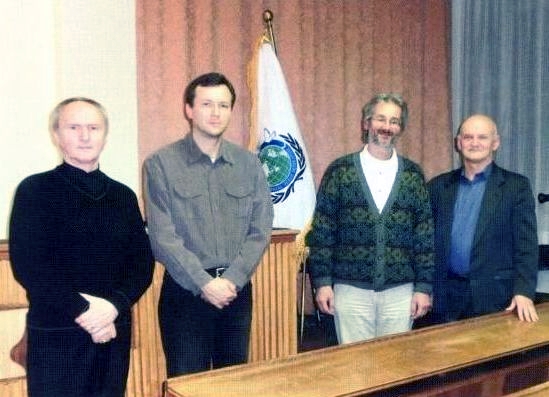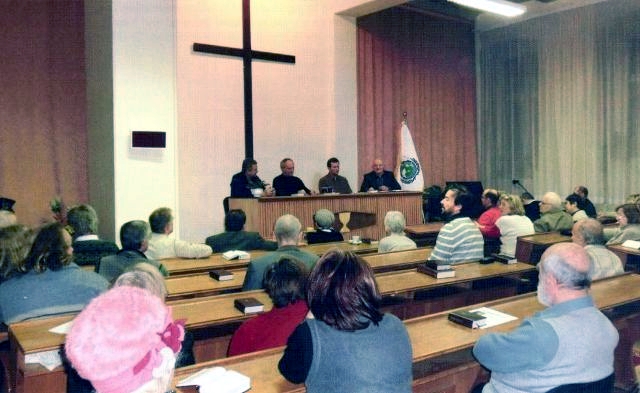![]()
The Words of the Grabner Family
|
|
The Words of the Grabner Family |

From
left: Archbishop Augustin Bacinsky, Rev. Miroslav Rybar, an audience
member and Mr. Milos Klas, head of UPF Slovakia
This year, 2013, marks 1,700 years since religious freedom was declared in the Roman Empire. In Al) 313, the Roman emperors Constantine and Licinius announced, "It was proper that the Christians and all others should have liberty to follow that mode of religion which to each of them appeared best." Before the Edict of Milan was issued, Christians had suffered severe persecution repeatedly. Their refusal to venerate the supreme god Jupiter as well as the "divine emperor" was considered an act of treason. As a result, the Roman authorities ordered Christian buildings and homes to be torn down and their sacred books collected and burned; Christian believers were arrested, tortured, mutilated or condemned to death; their children were taken from them and given to pagan parents.
The Edict of Milan conferred toleration not only on Christians but on every other faith, too. But as time went on, Constantine showed increasing favor to the Christians; his mother Helena was a fervent Christian and was later declared a saint. Her still pagan son built magnificent churches and established allowances of grain for the clergy and the poor. Many of his favorite officials were Christians, and the education of his sons was put in Christian hands. Bishop Eusebius of Caesarea hailed Constantine the champion of Christianity -- though the emperor was baptized only shortly before his death.
Because of the edict, many historians consider AD 313 the birth year of religious freedom.
UPF-Slovakia felt it was appropriate to highlight the historic watershed during an event on November 27 in Bratislava. UPF members approached various theologians; after searching for some time, they found two bishops and two theologians that were prepared to speak. The event title "Quo vadis, Christianity?"' was chosen because there is much debate about the future of Christianity in European secular societies today.
Much acclaimed was the presentation of Archbishop Augustin Bacinsky, head of the Old Catholic Church in Slovakia. He compared the situation of Christians in the Roman Empire before and after 313 with Christians' circumstances in the communist countries before and after 1989. During the periods of persecution, Christians displayed more enthusiasm and active involvement than in times of peace, he said. When the first council gathered in the town of Nicaea in AD 325, many bishops were overwhelmed by the fantastic treatment offered them by the imperial court.
Likewise, after 1989 the Christian clergy found doors wide open on all levels of government in the former Communist states. Invitations to festivities and banquets given by the president or the prime minister and other high ranking institutions were a common thing. "This was not a bad thing itself but the social obligations made us sleepy and fostered unhealthy loyalty toward the state authorities," says Bacinsky. And some historic chances were lost, to make the new society a true Christian one.
Bacinsky recalls a meeting in his apartment in the Czech town of Brno. He discussed with friends what to do with the new gained freedom. After reading in his prayer book, some inner voice told him, "Establish an ecumenical prayer forum! Visit the Catholic Vicar-General Horky!" He went to the Catholic cathedral but while going there he became insecure about how to approach Horky. "There was no one at the cathedral. In the court of the bishop's office there was only one person. I went there and saw that it was the vicar-general himself, but instead of approaching him I entered the cathedral." After a while, Bacinsky came out again but the vicar-general had gone. Sorry for his lack of courage, he walked into the city while still hearing the inner voice "Establish an ecumenical prayer forum!" He decided to ring the doorbell of the bishop's office of the Czechoslovak Husite Church -- Patriarch Stepanek and his secretary Bednarik invited him in and asked why he had come. "I knew them personally, so I felt easier to present them my idea. After listening to me, they said no word for a while. Then suddenly the patriarch took the telephone and started to call all church offices in Brno." Soon there was an ecumenical gathering at the Baptist church. Even a representative of the Jewish community showed up unexpectedly. For about forty days, the church leaders met continuously at different churches. An incredibly high spiritual atmosphere surrounded them. Unfortunately, all too soon economic issue such as the restitution of church property became the main concern; the unity of churches became less important. "As a result they went on a journey of a further forty years' wandering in the desert. When Jesus cast out evil spirits, many more came to enter the cleansed person and did greater harm. Our society today is worse than during the Communist period.
No decree even of the greatest ruler on Earth can give us the freedom which stems from the Origin of true freedom, whom we call God. I do not mean that we should disregard freedom granted for the citizens because the external aspect of freedom is also precious but true freedom is in our minds," Bacinsky outlined the lessons learned from history.

The
1,700-year anniversary of the Edict of Milan attracted a fair-sized
audience. Pictured here is the panel discussion.
Another well received presentation was given by UTS graduate Rev. Miroslav Rvbar who lives in the town of Nitra. "The situation then was not black and white -- bad Romans and good Christians or vice versa. In reality many Christians were peaceful people ready to offer their lives for Christ. But on the other hand some of them wanted other people to believe what they considered the truth, and therefore behaved even violently toward pagans and Christians of differing convictions. I would like to stress that intolerance is the real issue!"
He also stressed, that religious freedom in the past was understood differently than today. "Just let us look at the situation during the Roman Empire in more detail. For which reasons were Christians persecuted?" Generally speaking, there were four aspects: Firstly, Christians were persecuted by the Jews who were convinced that Jesus and his followers were guilty of heresy and blasphemy. Starting with the stoning of the disciple Stephen, for centuries the Jewish communities in various parts of the empire persecuted Christians and accused them in front of the Roman authorities. Their disputes disrupted the order of society considerably.
Secondly, the Christians were persecuted because their neighbors, fellow citizens, relatives and others could not understand their "strange behavior." Christians did not follow the ancient traditions, did not participate in religious rituals and processions and even said that the ancient gods were "devils" or "demons." Yes, Christians were criticized for their lack of tolerance toward other faiths! Their anti-social behavior was judged as "harmful to society." As a result, persecution did not start from the Roman authorities, but within their social surroundings. Allegations against them included the practice of black magic, incest (because they called themselves brothers and sisters) and cannibalism (eat Jesus' flesh and drink his blood), and frightening others by proclaiming the end of the world. It was outrageous that they venerated a lawfully executed criminal. Additionally, the population feared that their gods might punish them if they did not prevent the Christian attacks on their gods. It was not uncommon, that the Roman authorities had to protect Christians from the anger of the crowds!
Thirdly, the Christians were persecuted because the Roman authorities judged them as politically unreliable elements or as being guilty of treason because they did not venerate Jupiter and the emperor. The empire was polytheistic and the Romans were basically tolerant toward all faiths and religious traditions. Greek, Egyptian. Celtic and other gods were adopted into the Roman pantheon of gods. In this spirit, according to Tertullian, Emperor Tiberius (AD 14-37) proposed that the Senate in Rome legalize Christianity and adopt Jesus as a god! The Senate rejected this proposal because of the nonconformist behavior of Christians, and their refusal to accept the other gods.
Fourthly, Christians, in some way, persecuted their fellow Christians because of differing opinions and interpretations of the Bible and the identity and mission of Jesus. During the first century, there was generally freedom of interpretation, belief and practice.
At the end of the second century, the famous bishop Irenaeus wrote tractates about what constitutes heresy, claiming that there can be only one truth and one true church. In the following centuries, the practice of excluding and punishing "heretics" became a common feature of the Christian community.
In the period after 313, a dramatic reversal occurred: Emperor Constantine allowed the destruction of pagan temples, which had been punishable by death until then. His son Constantine II decreed to close down all pagan temples and prohibited pagan offerings. During his rule, the Christians systematically started to demolish pagan temples and monuments. In 390 Emperor Theodosius declared war on paganism; people were not allowed to enter pagan sanctuaries. "The Christians did not approve of granting all citizens religious freedom because they saw their own faith as the only truth. Instead of winning the hearts of their fellow citizens and converting them in a peaceful manner, they resorted to violence," says Miroslav Rybar. Again, there is a parallel with 1989, when the churches gained freedom "They soon proved to be intolerant toward other creeds and religious groups. As at the time of Constantine, the state authorities readily helped the traditional churches to persecute other religious groups." Our event was held on November 27, 2013 at the Husite Church in Bratislava.
About forty people came to hear the speakers. UPF general secretary Milos Klas was the presenter. He also read a paper prepared by Professor Peter Gazik from the Department of Religious Studies at Commenius University, who could not participate personally.
The Catholic theologian Martin Deininger explained that some church circles consider the privileges granted by Constantine and his successors to be a mistake, because it corrupted the spirit of Christianity. He also said remarkable things about the lineage of Constantine the Great. Bishop Jan Hradil of the Husite church opened the panel discussion with welcoming remarks.